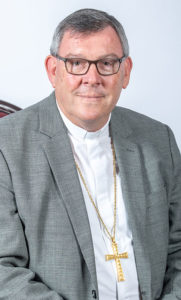
Although he was in Rome participating in the Synod on Youth, Archbishop Anthony Fisher OP of Sydney said that he stood united with Prime Minister Scott Morrison as he delivered the national apology to victims and survivors of institutional child sexual abuse on Monday in the nation’s Parliament.
Although he couldn’t be in Canberra, the timing was significant. The Synod called by Pope Francis focusing on youth and how the Church can better reach out to them around the world has been powerfully conscious of the phenomenon of abuse which has dominated its life for the last two decades.
Numerous participants have made calls throughout the Synod for the reality of abuse to be faced by the Church and adequately responded to.
Archbishop Fisher said that, like the Australian Government, the Church has listened to the Royal Commission, survivors and their families, and again extends its heartfelt gratitude to those who had the courage to come forward and tell their traumatic stories.
“I reiterate my unconditional apology for these heinous crimes and for the lives so damaged, and recommit to doing all in our power to ensure it never happens again,” Archbishop Fisher said.
“At the Service of Prayer for Forgiveness and Reparation held at St Mary’s Cathedral in March, we prayed for all people affected by abuse within the Church, acknowledging these crimes were a catastrophe for so many individuals and families, for our institutions and society.
“We confessed that many Church leaders also let young people down by not responding to reports received.
“We are determined that the learnings from the Commission process will become an integral part of our Church life and have committed to new structures and policies, better care of past victims and proactive efforts to prevent there being any victims in the future.
“At the request of the Government and survivors, the Church will play no official part in today’s event, but we thank the Prime Minister for uniting our nation with this national apology and hope it provides some comfort to survivors, their family and friends.”
Elsewhere, Catholic institutions around the nation also responded to Prime Minister Morrison’s heartfelt apology to victims of abuse.
In the Diocese of Wollongong, Bishop Brian Mascord led all diocesan institutions – parishes, schools, healthcare institutions and agencies – in officially recognising the Apology.
“The National Apology is an important acknowledgment that those voices have been heard and will continue to be heard. It also provides further impetus for us to focus our efforts to protect current and future generations of children and vulnerable people,” Bishop Mascord said in a Pastoral statement distributed with an accompanying prayer distributed to all parents and carers in Wollongong Catholic schools.

The statement was also read at all Masses over the weekend before Monday’s Apology.
“I acknowledge and unequivocally support the Prime Minister’s apology on behalf of the nation to victims and survivors of abuse. I am conscious of the hurt and pain that has been caused to young and vulnerable people by members of our Church community, and I give thanks to those who found the courage and strength to speak out,” Bishop Mascord said as he issued the pastoral.
On Monday, Wollongong’s Catholic schools and agencies observed the Apology by pausing normal daily business to read reflections, pray and spend time in silence to remember children and vulnerable individuals who were hurt, and to give thanks for those who found the courage to speak out.
Meanwhile, the body representing Catholic religious orders and institutes in Australia joined with the nation’s bishops to welcome the Apology.
“The National Apology today and the apologies made by institutions during the life of the Royal Commission and since have been an important validation of the courage of survivors of abuse in seeking truth, justice and healing. We think first of them at this time,” said Catholic Religious Australia president Sr Monica Cavanagh RSJ.
Archbishop Mark Coleridge, president of the ACBC, said abuse perpetrated by priests, brothers, sisters and lay people was “an utter betrayal of the Gospel of Jesus Christ, and it should never have happened”.
He said the Catholic Church acknowledged that Monday’s apology was for survivors and their supporters, not for representatives of institutions.
Many Catholic dioceses, communities, schools, ministries and agencies also holding local events to mark the National Apology – something Archbishop Coleridge called “a significant moment in our ongoing efforts to make Australia safe for all children and young people”.
In his Apology, Prime Minister Morrison first thanked the 17,000 survivors who had come forward to share their experiences, nearly 8,000 of whom recounted their abuse in private sessions of the Royal Commission in Abuse in Institutions established by then_PM Julia Gillard in 2013.
Among responses enacted by the government, he said, were the commencement of the National Redress Scheme, which will provide survivors of abuse with access to counselling and psychological services, monetary payments and, for those who desire it ,a personal response from the institution where the abuse occurred.
The establishment of the National Office of Child Safety on 1 July which will operate within the Department of Social Services on was “another big step forward to ensuring the prevention and detection of child abuse wherever it occurs,” he said.
The issue is so important he had decided to ensure that the Office would report directly to him, he said.
Mr Morrison also committed to the establishment of a National Centre of Excellence to raise awareness and understanding of the impacts of child sexual abuse, to deal with stigma and to support victims. It would also seek to guide best practice for training and other services.
The Office’s report would be delivered annually to Parliament for at least the next five years, he said.
The PM also committed to establishing a National Museum which would serve “as a place of truth and commemoration, to raise awareness and understanding of the impacts of child sexual abuse.”
